英语专业考研指导分析共80页文档
- 格式:ppt
- 大小:8.08 MB
- 文档页数:80
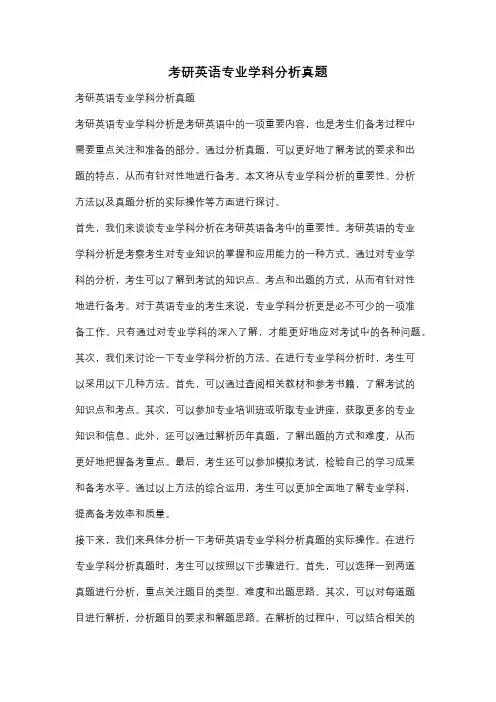
考研英语专业学科分析真题考研英语专业学科分析真题考研英语专业学科分析是考研英语中的一项重要内容,也是考生们备考过程中需要重点关注和准备的部分。
通过分析真题,可以更好地了解考试的要求和出题的特点,从而有针对性地进行备考。
本文将从专业学科分析的重要性、分析方法以及真题分析的实际操作等方面进行探讨。
首先,我们来谈谈专业学科分析在考研英语备考中的重要性。
考研英语的专业学科分析是考察考生对专业知识的掌握和应用能力的一种方式。
通过对专业学科的分析,考生可以了解到考试的知识点、考点和出题的方式,从而有针对性地进行备考。
对于英语专业的考生来说,专业学科分析更是必不可少的一项准备工作。
只有通过对专业学科的深入了解,才能更好地应对考试中的各种问题。
其次,我们来讨论一下专业学科分析的方法。
在进行专业学科分析时,考生可以采用以下几种方法。
首先,可以通过查阅相关教材和参考书籍,了解考试的知识点和考点。
其次,可以参加专业培训班或听取专业讲座,获取更多的专业知识和信息。
此外,还可以通过解析历年真题,了解出题的方式和难度,从而更好地把握备考重点。
最后,考生还可以参加模拟考试,检验自己的学习成果和备考水平。
通过以上方法的综合运用,考生可以更加全面地了解专业学科,提高备考效率和质量。
接下来,我们来具体分析一下考研英语专业学科分析真题的实际操作。
在进行专业学科分析真题时,考生可以按照以下步骤进行。
首先,可以选择一到两道真题进行分析,重点关注题目的类型、难度和出题思路。
其次,可以对每道题目进行解析,分析题目的要求和解题思路。
在解析的过程中,可以结合相关的专业知识和理论进行解答,从而更好地理解题目的含义和出题的目的。
最后,可以总结每道题目的解题技巧和注意事项,为后续的备考提供参考。
在进行专业学科分析真题时,考生还需要注意一些细节。
首先,要注意真题的来源和发布时间,以便及时获取最新的考试信息和动态。
其次,要注意真题的难度和出题风格,从而更好地把握备考的方向和重点。

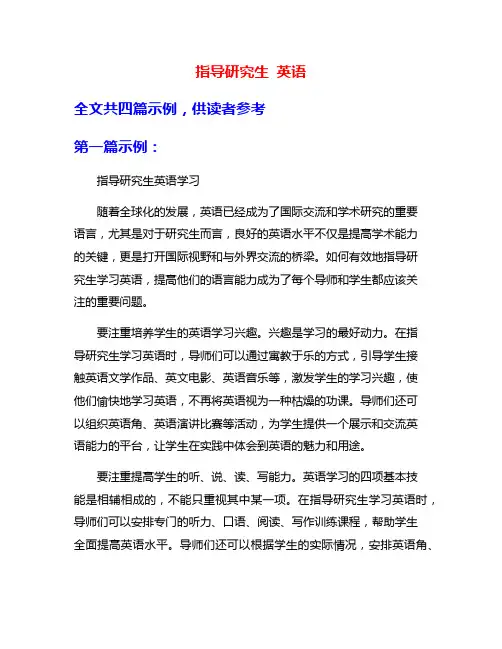
指导研究生英语全文共四篇示例,供读者参考第一篇示例:指导研究生英语学习随着全球化的发展,英语已经成为了国际交流和学术研究的重要语言,尤其是对于研究生而言,良好的英语水平不仅是提高学术能力的关键,更是打开国际视野和与外界交流的桥梁。
如何有效地指导研究生学习英语,提高他们的语言能力成为了每个导师和学生都应该关注的重要问题。
要注重培养学生的英语学习兴趣。
兴趣是学习的最好动力。
在指导研究生学习英语时,导师们可以通过寓教于乐的方式,引导学生接触英语文学作品、英文电影、英语音乐等,激发学生的学习兴趣,使他们愉快地学习英语,不再将英语视为一种枯燥的功课。
导师们还可以组织英语角、英语演讲比赛等活动,为学生提供一个展示和交流英语能力的平台,让学生在实践中体会到英语的魅力和用途。
要注重提高学生的听、说、读、写能力。
英语学习的四项基本技能是相辅相成的,不能只重视其中某一项。
在指导研究生学习英语时,导师们可以安排专门的听力、口语、阅读、写作训练课程,帮助学生全面提高英语水平。
导师们还可以根据学生的实际情况,安排英语角、口语交流活动、阅读讨论小组等活动,提供各种实践机会,让学生在实践中不断提升各项英语技能。
要注重扩大学生的词汇量和语法知识。
词汇是语言的基础,语法则是语言的规则。
在指导研究生学习英语时,导师们可以安排学生背诵英语单词、熟记英语语法规则,帮助他们扩大词汇量和提高语法水平。
导师们还可以推荐一些适合学生阅读的英语书籍、杂志、报纸等,让学生在阅读中不断积累词汇和语法知识,提高自身的语言水平。
要注重提高学生的学术英语水平。
对于研究生而言,学术英语的重要性不言而喻。
在指导研究生学习英语时,导师们可以安排学生学习学术英语写作规范、学习学术英语阅读技巧、提高学术英语口语表达能力,帮助他们逐步掌握学术英语的要领。
导师们还可以指导学生撰写英文论文、参加国际学术会议、进行国际合作研究等活动,让学生在实践中提高学术英语水平,为今后的学术研究和国际交流打下坚实基础。
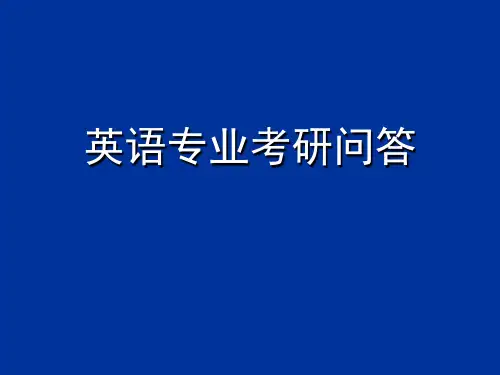

英语专业考研指南:新手必看的全面攻略English:As a beginner in the field of English major postgraduate entrance examination, it is important to have a comprehensive guide to prepare oneself for the examination. Here are some tips to help you succeed in the exam:1. Understand the exam format: The English major postgraduate entrance examination usually consists of two parts: written test and oral test. The written test includes language proficiency, comprehensive reading and writing, and translation. The oral test includes listening, speaking, and interview.2. Prepare early: Start preparing for the exam early to avoid last-minute cramming. Set a study schedule and stick to it. Focus on improving your language skills, especially in reading and writing.3. Practice regularly: Consistent practice is key to success in the exam. Practice reading and writing in English every day, and listen to English news or podcasts to improve your listening and speaking skills. Take mock exams to familiarize yourself with the exam format and identify areas for improvement.4. Build vocabulary: Vocabulary is an important part of the exam. Read English literature and newspapers to improve your vocabulary. Use flashcards or apps to memorize new words and review them regularly.5. Seek help: Don't hesitate to seek help from teachers, tutors, or classmates. Join study groups or online forums to discuss exam strategies and share tips.Overall, the key to success in the English major postgraduate entrance examination is consistent practice, early preparation, and a positive attitude. With these tips in mind, you can be well on your way to acing the exam.中文:作为英语专业考研的新手,为了准备好考试,有一份全面的指南是非常重要的。


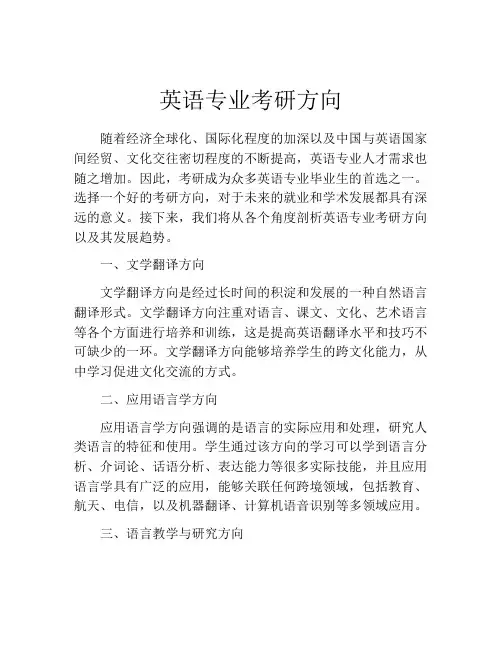
英语专业考研方向随着经济全球化、国际化程度的加深以及中国与英语国家间经贸、文化交往密切程度的不断提高,英语专业人才需求也随之增加。
因此,考研成为众多英语专业毕业生的首选之一。
选择一个好的考研方向,对于未来的就业和学术发展都具有深远的意义。
接下来,我们将从各个角度剖析英语专业考研方向以及其发展趋势。
一、文学翻译方向文学翻译方向是经过长时间的积淀和发展的一种自然语言翻译形式。
文学翻译方向注重对语言、课文、文化、艺术语言等各个方面进行培养和训练,这是提高英语翻译水平和技巧不可缺少的一环。
文学翻译方向能够培养学生的跨文化能力,从中学习促进文化交流的方式。
二、应用语言学方向应用语言学方向强调的是语言的实际应用和处理,研究人类语言的特征和使用。
学生通过该方向的学习可以学到语言分析、介词论、话语分析、表达能力等很多实际技能,并且应用语言学具有广泛的应用,能够关联任何跨境领域,包括教育、航天、电信,以及机器翻译、计算机语音识别等多领域应用。
三、语言教学与研究方向语言教学与研究方向是把语言学知识应用到实际教学中,将理论知识与教学策略相结合,受到使用者广泛的关注。
该方向主要包括语言教育、语言教学方法论等。
对于语言教学专业的学生来说,语言教学是一条不可或缺的道路,它将帮助我们更好地理解教育学和心理学,提高教学技能和个人发展。
四、跨文化交流与比较文化研究方向跨文化交流与比较文化研究方向是涉及语言学、文化学、社会学、外交学的交叉学科,它通过跨文化对话的方式,研究人类语言、文化以及其他国家的交流方式。
该方向可以帮助学生更好地理解它人的文化背景,从而促进跨文化的交流与融合,增强自己的国际竞争力。
五、语言技术与翻译方向随着信息时代的到来,人类对于机器表现的翻译速度、精确度及其承担的任务在不断增加。
因此,语言技术与翻译方向在翻译市场的不断发展中越来越受到重视。
该方向的学生将学习自然语言识别与生成,机器学习等各种技术,同时也将了解计算语言学、自然语言处理等相关领域。
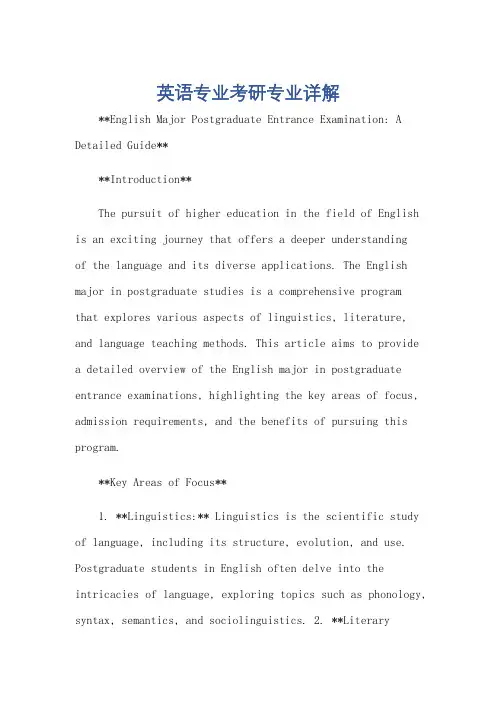
英语专业考研专业详解**English Major Postgraduate Entrance Examination: A Detailed Guide****Introduction**The pursuit of higher education in the field of English is an exciting journey that offers a deeper understandingof the language and its diverse applications. The English major in postgraduate studies is a comprehensive programthat explores various aspects of linguistics, literature, and language teaching methods. This article aims to provide a detailed overview of the English major in postgraduate entrance examinations, highlighting the key areas of focus, admission requirements, and the benefits of pursuing this program.**Key Areas of Focus**1. **Linguistics:** Linguistics is the scientific study of language, including its structure, evolution, and use. Postgraduate students in English often delve into the intricacies of language, exploring topics such as phonology, syntax, semantics, and sociolinguistics.2. **LiteraryStudies:** Literary studies focus on the analysis and interpretation of literary texts, including novels, poems, plays, and essays. Students engage with classic and contemporary works, developing a critical understanding of literary forms, themes, and techniques. 3. **Language Teaching Methodology:** This area explores effective teaching methods for English language learners at different levels. Postgraduate students may study techniques such as task-based learning, content-based instruction, and second language acquisition theory.**Admission Requirements**Admission to postgraduate programs in English typically requires a bachelor's degree in a related field, such as English, Linguistics, or Education. Applicants are usually required to submit transcripts, letters of recommendation, a personal statement or research proposal, and scores from standardized tests such as the GRE or GMAT. Some programs may also require proficiency in a second language or a teaching certificate.**Benefits of Pursuing the English Major in Postgraduate Studies**1. **Enhanced Career Opportunities:** A postgraduate degree in English can lead to a wide range of career opportunities, including teaching at the secondary or tertiary level, publishing, translation, and corporate communication.2. **Deepened Understanding of Culture and Society:** Studying English at the postgraduate level allows students to gain a deeper understanding of different cultures and societies through the analysis of literary works and linguistic patterns.3. **Critical Thinking Skills:** The critical analysis of literary texts and linguistic phenomena cultivates students' critical thinking skills, which are valuable in various professions.4.**Research Capabilities:** Postgraduate studies in English cultivate students' research capabilities, enabling them to conduct independent research projects and contribute to academic discussions.**Conclusion**The English major in postgraduate studies offers a comprehensive and rewarding academic experience that equips students with the knowledge and skills necessary for success in a variety of professional fields. With a focuson linguistics, literary studies, and language teaching methodology, this program prepares students to make meaningful contributions to the field of English language and literature. The admission requirements and benefits associated with this program make it an attractive optionfor those seeking to further their education and expandtheir professional horizons.**英语专业考研专业详解****引言**英语专业考研是深入探索英语语言及其应用的激动人心的旅程。
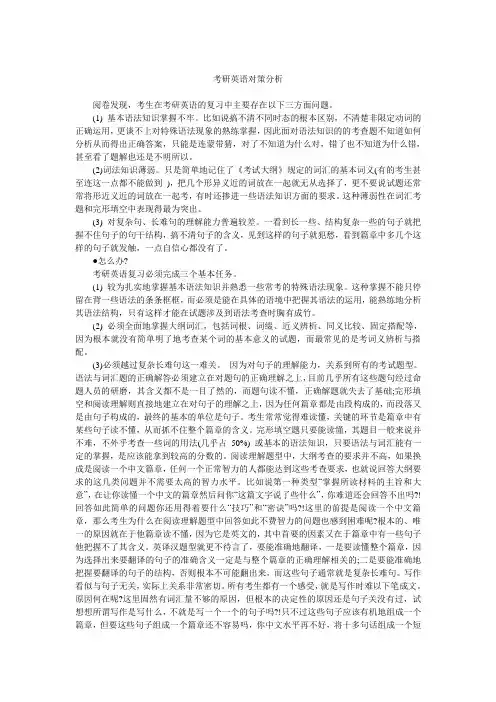
考研英语对策分析阅卷发现,考生在考研英语的复习中主要存在以下三方面问题。
(1) 基本语法知识掌握不牢。
比如说搞不清不同时态的根本区别,不清楚非限定动词的正确运用,更谈不上对特殊语法现象的熟练掌握,因此面对语法知识的的考查题不知道如何分析从而得出正确答案,只能是连蒙带猜,对了不知道为什么对,错了也不知道为什么错,甚至看了题解也还是不明所以。
(2)词法知识薄弱。
只是简单地记住了《考试大纲》规定的词汇的基本词义(有的考生甚至连这一点都不能做到),把几个形异义近的词放在一起就无从选择了,更不要说试题还常常将形近义近的词放在一起考,有时还掺进一些语法知识方面的要求。
这种薄弱性在词汇考题和完形填空中表现得最为突出。
(3) 对复杂句、长难句的理解能力普遍较差。
一看到长一些、结构复杂一些的句子就把握不住句子的句干结构,搞不清句子的含义,见到这样的句子就犯愁,看到篇章中多几个这样的句子就发触,一点自信心都没有了。
●怎么办?考研英语复习必须完成三个基本任务。
(1) 较为扎实地掌握基本语法知识并熟悉一些常考的特殊语法现象。
这种掌握不能只停留在背一些语法的条条框框,而必须是能在具体的语境中把握其语法的运用,能熟练地分析其语法结构,只有这样才能在试题涉及到语法考查时胸有成竹。
(2) 必须全面地掌握大纲词汇,包括词根、词缀、近义辨析、同义比较、固定搭配等,因为根本就没有简单明了地考查某个词的基本意义的试题,而最常见的是考词义辨析与搭配。
(3)必须越过复杂长难句这一难关。
因为对句子的理解能力,关系到所有的考试题型。
语法与词汇题的正确解答必须建立在对题句的正确理解之上,目前几乎所有这些题句经过命题人员的研磨,其含义都不是一目了然的,而题句读不懂,正确解题就失去了基础;完形填空和阅读理解则直接地建立在对句子的理解之上,因为任何篇章都是由段构成的,而段落又是由句子构成的,最终的基本的单位是句子。
考生常常觉得难读懂,关键的环节是篇章中有某些句子读不懂,从而抓不住整个篇章的含义。
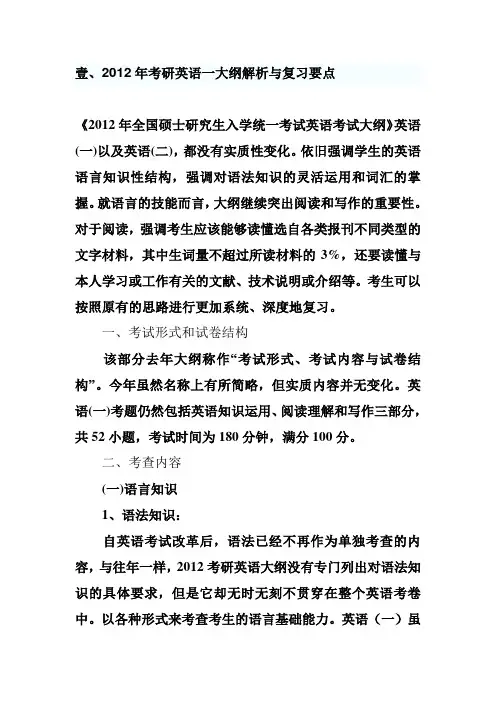
壹、2012年考研英语一大纲解析与复习要点《2012年全国硕士研究生入学统一考试英语考试大纲》英语(一)以及英语(二),都没有实质性变化。
依旧强调学生的英语语言知识性结构,强调对语法知识的灵活运用和词汇的掌握。
就语言的技能而言,大纲继续突出阅读和写作的重要性。
对于阅读,强调考生应该能够读懂选自各类报刊不同类型的文字材料,其中生词量不超过所读材料的3%,还要读懂与本人学习或工作有关的文献、技术说明或介绍等。
考生可以按照原有的思路进行更加系统、深度地复习。
一、考试形式和试卷结构该部分去年大纲称作“考试形式、考试内容与试卷结构”。
今年虽然名称上有所简略,但实质内容并无变化。
英语(一)考题仍然包括英语知识运用、阅读理解和写作三部分,共52小题,考试时间为180分钟,满分100分。
二、考查内容(一)语言知识1、语法知识:自英语考试改革后,语法已经不再作为单独考查的内容,与往年一样,2012考研英语大纲没有专门列出对语法知识的具体要求,但是它却无时无刻不贯穿在整个英语考卷中。
以各种形式来考查考生的语言基础能力。
英语(一)虽然没有专门的题型考查语法,但实际上任何题型都要涉及语法,完形填空要求掌握一定的语法知识、句式结构;阅读理解题和英译汉中有大量的长难句,这些句子只有具备一定的语法知识才能正确分析;翻译题这几年的趋向更是越来越侧重考核结构偏长偏难的句子,作文中要写出正确无误的句子,也需要语法知识。
这说明尽管我们在考题中不出现专项的语法考试题型,但如果对语法结构的掌握不够熟悉,就难以达到考研要求,难以在考试中取得好成绩。
所以在复习中应当注重语法的学习。
其实高中英语已经覆盖了基本的语法知识,只要我们在复习中进一步融会贯通,就可以达到考研语法的要求。
考研英语对于语法考查的侧重点和难点在于非谓语动词、从句以及一些插入语。
从句包括定语从句、名词性从句、状语从句等,他们的存在使句子的结构更为复杂,让考生更难看明白句子的成分。